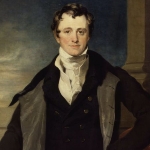Background
Davy was born on May 24, 1790, in Penzance, England, the youngest child and second son of Robert and Grace Millett Davy.

Davy was born on May 24, 1790, in Penzance, England, the youngest child and second son of Robert and Grace Millett Davy.
Left fatherless at the age of four, Davy attended the schools of Penzance until 1808, when he went to London to assist his brother in the laboratory of the Royal Institution. He received no formal instruction there but was encouraged and guided.
During his years at the University of Edinburgh, 1810-1814, Davy successfully defended his brother’s recently proposed views on the elemental nature of chlorine against the attacks by John Murray of that university. Out of this work, he published the analyses and properties of the metallic chlorides, and first prepared, named, and characterized phosgene gas. Davy received the M.D. in 1814, submitting a dissertation on the blood.
Davy was commissioned in the army as a hospital assistant. Shortly before the battle of Waterloo, he was assigned to the hospital at Brussels, and his experience there determined him on a career in the army medical service, in which he spent his entire professional life, eventually attaining the rank of inspector general of hospitals. He served many years abroad, in Ceylon, the Mediterranean islands, and the West Indies. Wherever he was stationed, Davy was a constant observer of the life habits and cultural practices of the native population, which he recorded with sympathy and detachment. He also dosed their bodies, took their temperatures, dissected their domestic and wild animals, and analyzed their minerals.
A diligent researcher and indefatigable writer, Davy derived his major scientific works from his medical service. Researches Physiological and Anatomical appeared in 1839, Diseases of the Army in 1862, and Physiological Researches in 1863. A voluminous output of papers on a broad miscellany of small topics reflects the range of opportunities that his travels presented to his ever alert but rather superficial curiosity.
Davy was a persistent and oversensitive defender of his brother’s reputation. He wrote a two-volume biography in 1836 and edited the Collected Works of Sir Humphry Davy in 1839-1840 and a collection of letters and fragmentary works in 1858. He created a trivial quarrel with the gentle Faraday in the 1830’s, and as late as the 1860’s he was still defending Humphry’s conduct as president of the Royal Society against renewed attacks by Charles Babbage.
Although Davy’s scientific work is not of first rank, the wealth of original documentation provides a splendid opportunity for a significant study of a man whose professional career and attitudes are not unrepresentative of his times.
Davy is best known for his observations. Although more opportune than creative, they are not without insight; and his experiments show ingenuity. In 1863 he discovered that eggshells have about 8,000 pores that are large enough for oxygen to flow in and carbon dioxide to flow out by pumping pressurized air into an underwater egg and watching thousands of tiny bubbles appear on the surface of the shell.
Davy made a few original observations of significance, especially on the structure of the heart and circulatory system of the amphibians. His most sustained interest was in animal heat, and some of his observations on temperatures within the pulmonary circulation were widely cited at the time. He made thousands of temperature readings of men and beasts in all stages of health and sickness throughout the world; glowworms and elephants, clams and leopards, sharks, dogs, and chickens all felt his thermometer, but he seems not to have established any significant pattern or correlation.
Davy did not often distinguish between the significant observations and the merely curious. He avoided speculations, preferring the role of discoverer; and even the most obvious generalizations were put forward with brevity and caution.
Nothing is known of Davy's family.
